We proudly announce that Scribe, our revolutionary new Oracle design, is now live on Mantle, bringing the same security and trust assumptions that power MakerDAO, Spark, and others to the burgeoning Mantle Ecosystem.
Mantle offers a modular, high-performance Ethereum Layer 2 network built around an optimized UX, low fees, and faster finality.
“We're excited to offer Mantle ecosystem builders high quality, resilient, and truly decentralized Oracle infrastructure with Chronicle’s upcoming deployment,” said Head of BD & Growth, Jen Senhaji. “Beyond the enhanced security design features, Chronicle will allow builders to use classic push oracles, pull oracles for low latency needs (coming soon), custom yield oracles, and support for asset pairs not currently serviced by other Oracle providers.”
Our first Scribe Oracle to go live on Mantle will be the mETH/USD Oracle, supporting Mantle Network’s native ETH liquid staking token, mETH. Mantle Staked Ether (mETH) has been steadily growing in popularity as an LST, recently surpassing $1b in Total Value Locked (TVL), and we’re proud to provide a secure and verifiable Oracle to track the historical and real-time value of mETH in USD ($).
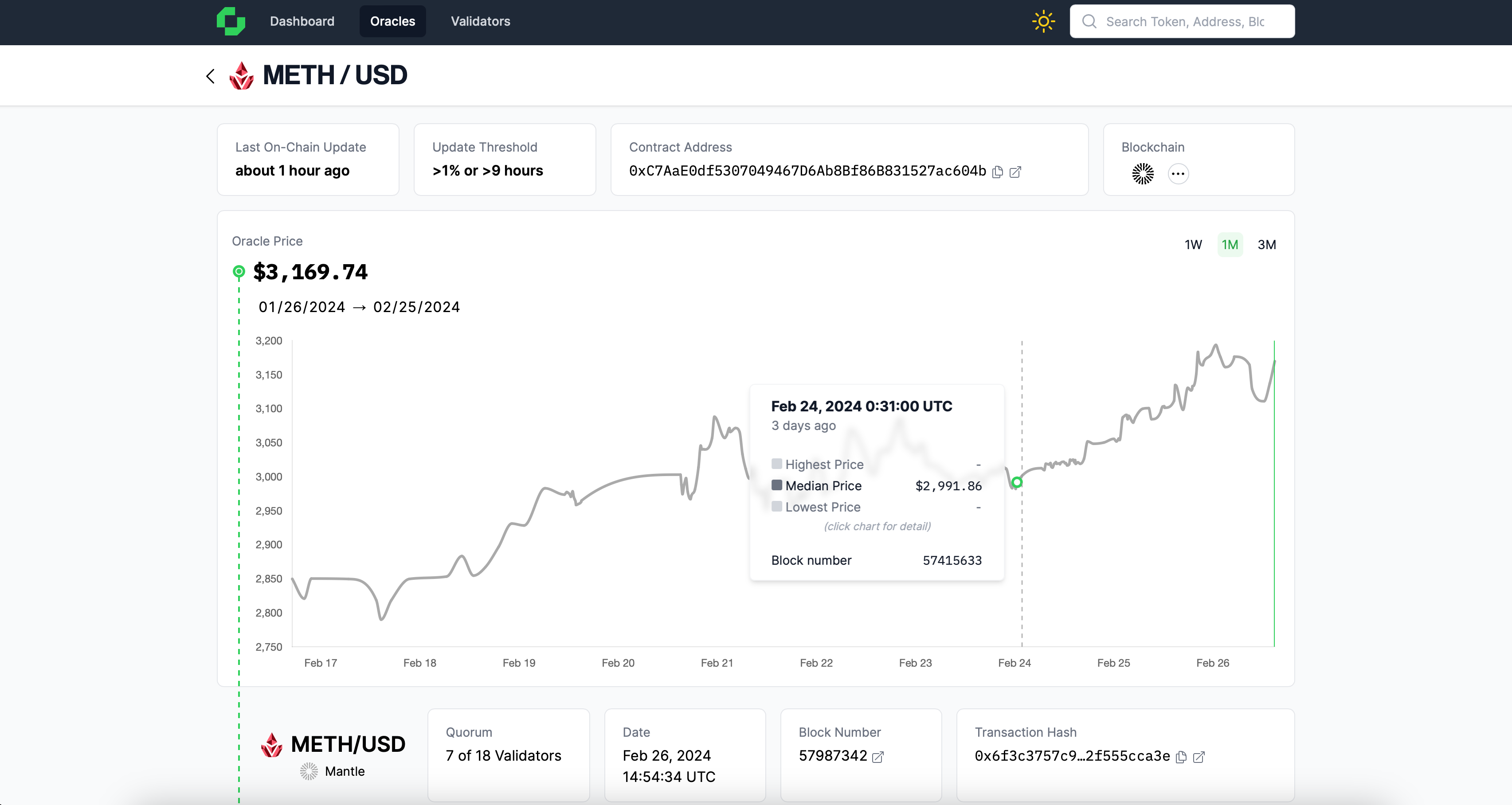
Also going live will be the MNT/USD price Oracle.
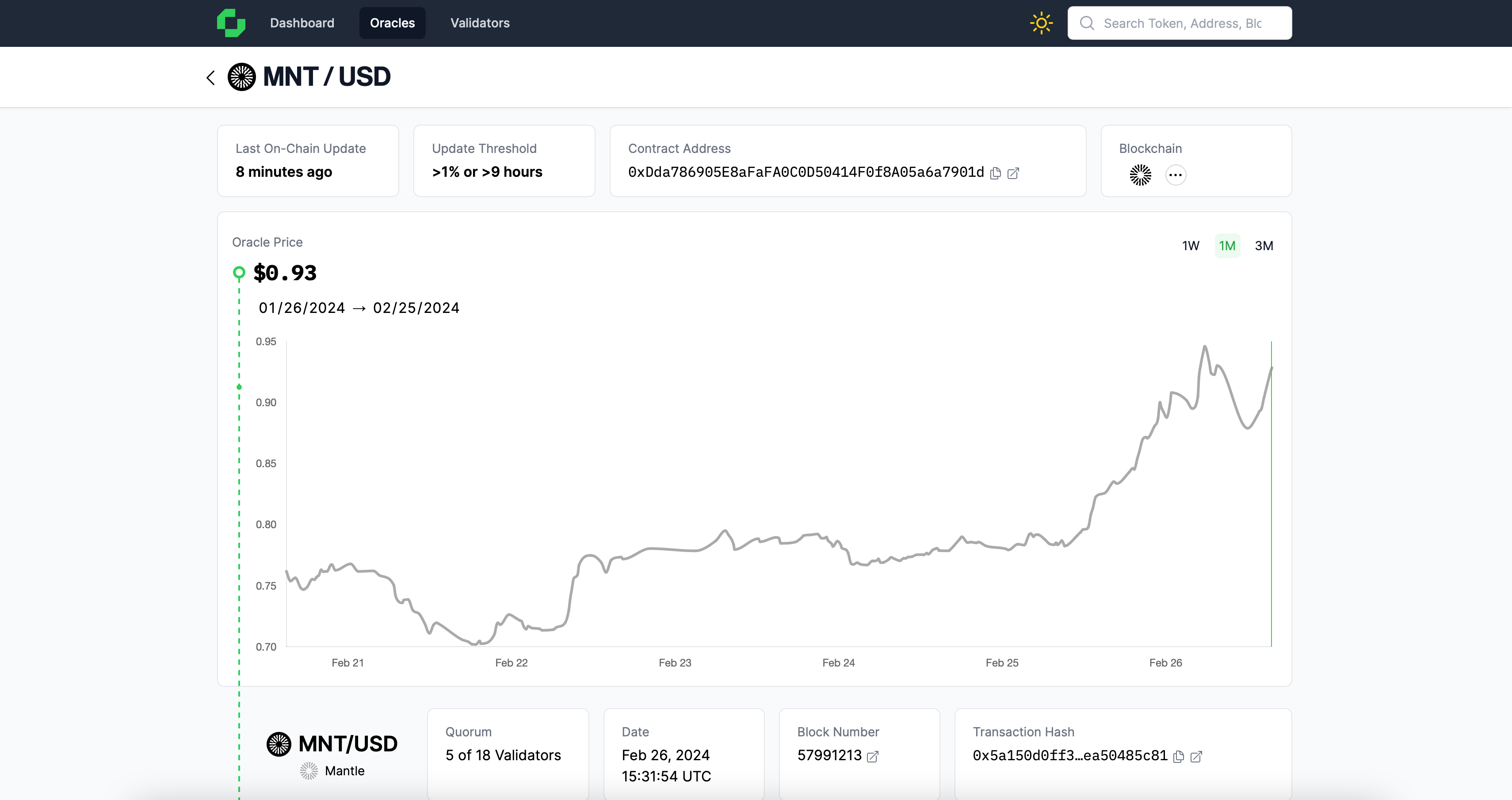
“We are thrilled to welcome Scribe by Chronicle into the Mantle Ecosystem, marking a pivotal step forward in our mission to build a more secure, transparent, and efficient blockchain environment. The introduction of the mETH/USD Oracle not only strengthens our infrastructure but also reaffirms our commitment to fostering innovation and supporting our builders with the tools they need to succeed. By leveraging Scribe's cutting-edge Oracle technology, we are setting a new benchmark for data accuracy and accessibility in the DeFi space, ensuring that our ecosystem not only meets but exceeds the evolving needs of our builders and users,” said Mark, head of BD at Mantle.
Mantle has an impressive record of incubating and supporting growth in its ecosystem, and we’re delighted to deploy Scribe for Mantle’s builders, providing a decentralized, verifiable, and cost-efficient network for transmitting data on-chain.
The TL;DR on Scribe
Choosing an Oracle to secure your protocol and its TVL is the most important consideration of them all. With that in mind, we’ve prepared a short rundown of the questions every Oracle user should have definitive, verifiable answers to:
Where does the data come from?
Chronicle Scribe displays every data source in real-time and historically via The Chronicle, our on-chain dashboard. Pick an Oracle, choose a time and date on the graph, and hit the drop-down arrow on any validator to see which exchanges they queried for the price data.
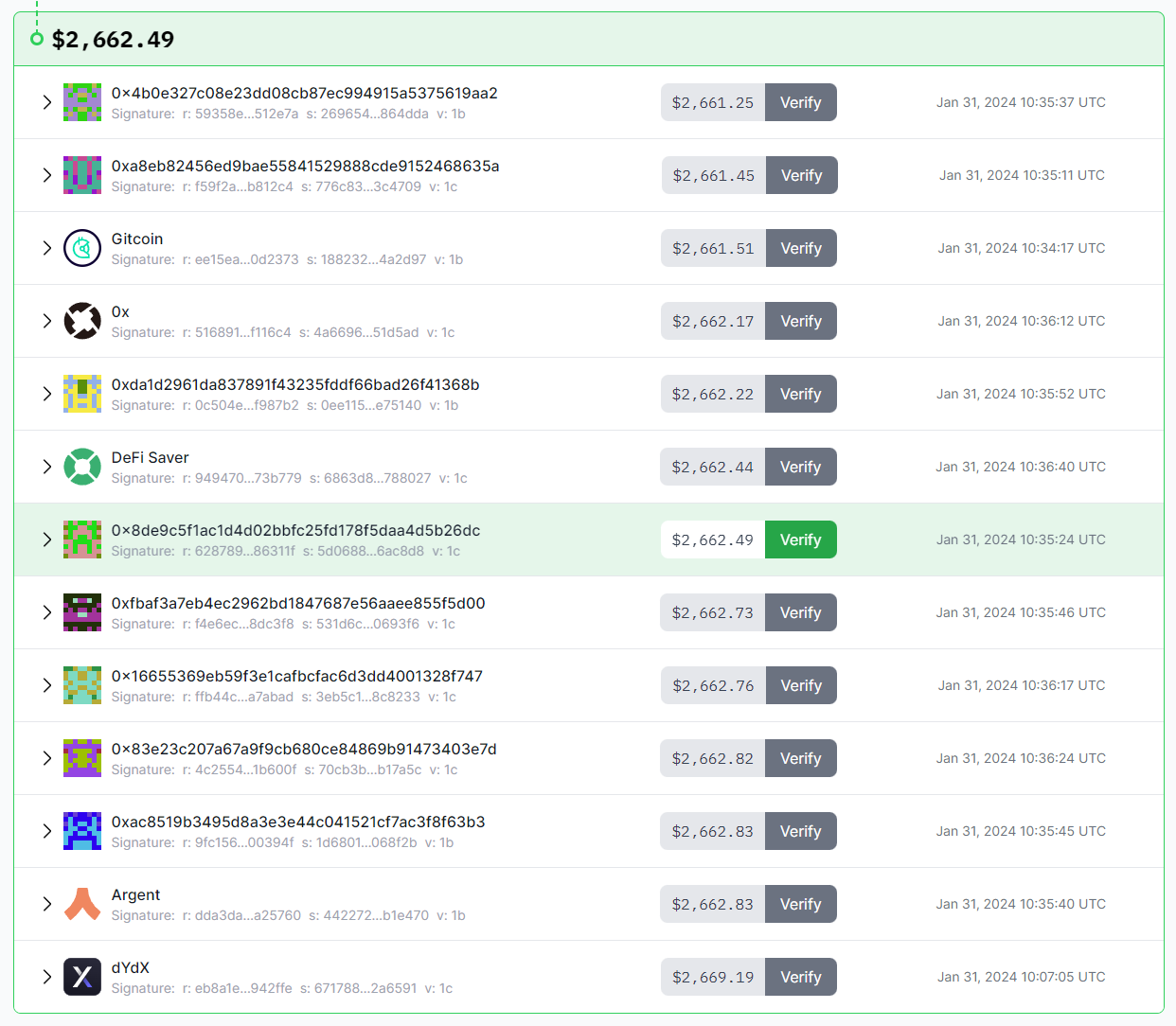
Oracle providers that use low volume and low liquidity exchanges or liquidity pools for data sources are the reason behind most DeFi protocol attacks. Every Oracle protocol should provide complete data source transparency to their users, and in a cryptographically verifiable way - not just words and images. Don’t trust, verify.
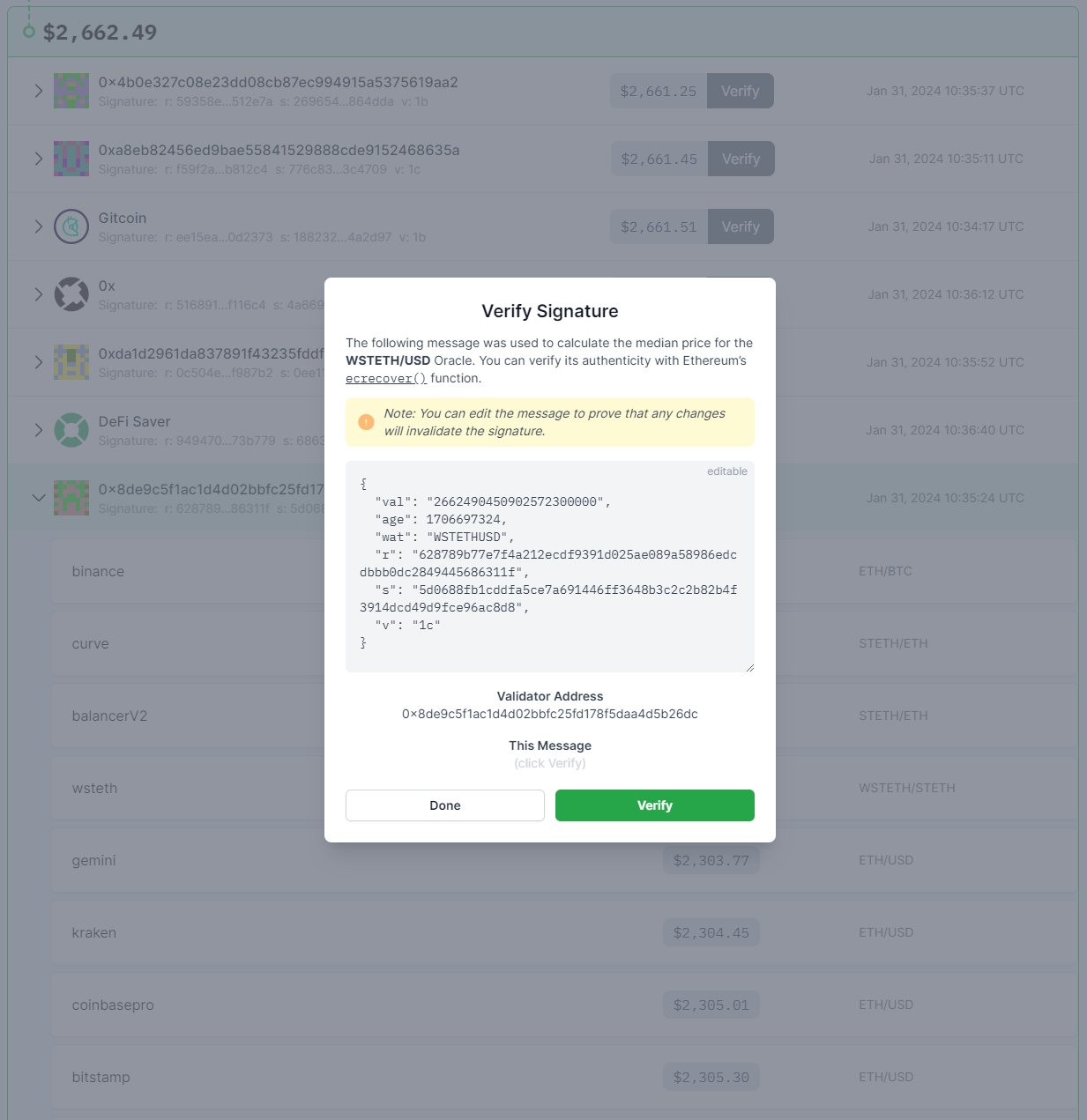
How many validators or signers does the protocol have?
At Chronicle, we refer to these protocol actors as validators. By other providers, they are sometimes referred to as signers or Oracles. Essentially, these are the actors that operate the nodes on the protocol that attest (or sign) to the integrity of the reported data (such as the price of BTC/USD at a specific time).
This is how to establish truth in an Oracle network. Enough of these nodes must report back with the requested data to develop a consensus. However, if a bad actor can gain control of the majority of these nodes, they can manipulate the reported data. Therefore, the more validators or nodes an Oracle protocol has and the more distributed (or decentralized) they are, the more secure it is from being hacked.
Using The Chronicle, anyone can see who Chronicle Protocol’s validators are, which cryptocurrency pairs or Oracles they are sourcing data for, and when their reported data was last updated.
Scribe is the first Oracle design to pioneer the use of Schnoor signatures. This allows Chronicle Protocol to scale to an unlimited number of validators. No other Oracle protocol can achieve this as they all use an implementation of ECDSA that has a linear relationship between the number of validators and the cost of operating the Oracle.
As a result, validator or signer numbers are low to keep costs down, sacrificing better security and decentralization.
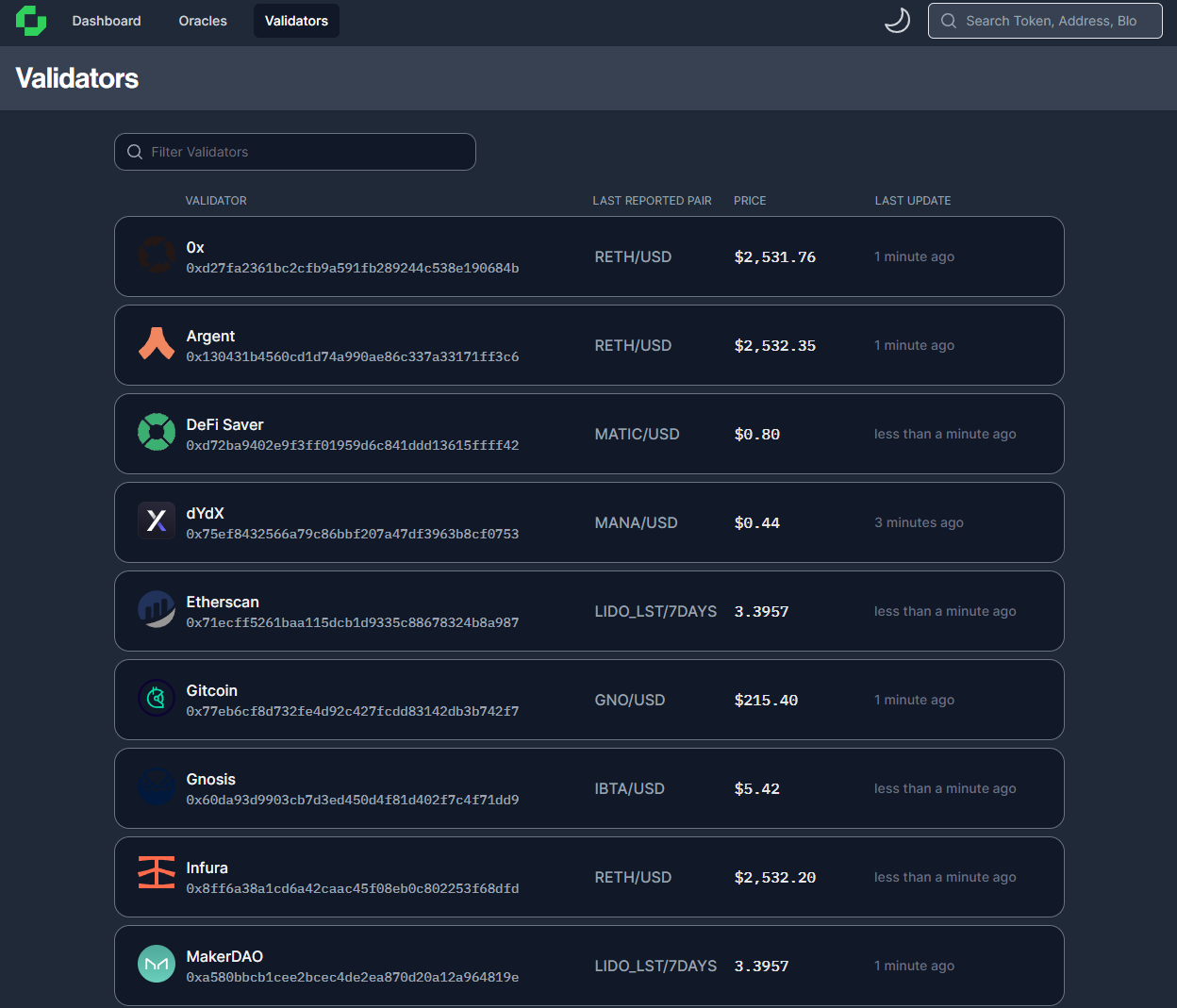
Who are the protocol validators or signers
Knowing the identity of the validators is just as important as the total number. This is because an actor running a node can report any data they please. For example, they could have the node report that BTC is worth $10,000 when the market value is $40,000, creating an attack vector and draining the DeFi protocol the Oracle ‘secures.’
Therefore, decentralized and distributed nodes should be at the top of your Oracle provider shopping list unless you want your Oracle provider to have the power to drain your project. Right now, there is more than one Oracle provider that runs all or the majority of their protocol’s nodes themselves, securing millions of dollars of TVL. Nothing stops them from draining your project if they get compromised or go rogue.
At Chronicle, all of our validators are identifiable, and many are operated by well-known brands with a good reputation and track record—projects such as MakerDAO, Infura, Gnosis, Gitcoin, Etherscan, and DeFi Saver. Our goal is to create a validator community of some of the most used protocols in the space, creating a positive feedback loop of increasing security and decentralization.
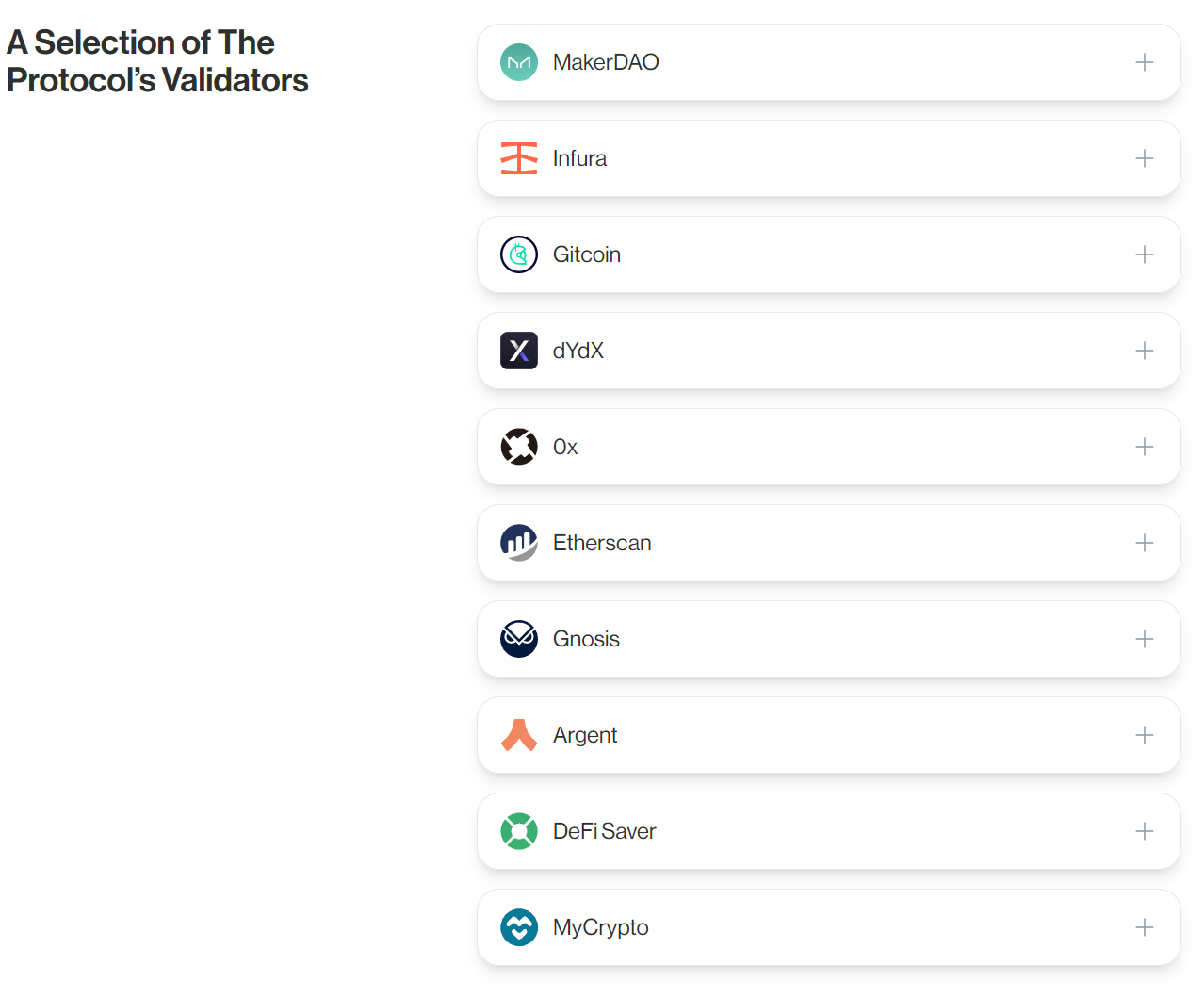
What does it cost to operate the Oracles?
Oracles are very gas-hungry. For example, every time the BTC/USD Oracle (or Feed) updates to the latest price, this has a gas cost as it is required to post the result on-chain. Regardless of L1 or L2, the more updates, the more cost, and the Oracle provider shoulders that cost. Therefore, many Oracle providers look to update the data less frequently. This creates stale data and opens up opportunities for arbitrage, with both the Dapp and the user of the Dapp losing out.
With Scribe, we have tackled the underlying engineering problem behind the high cost of operating Oracles. The result is an Oracle that costs up to 6x less than Chainlink to update and 3.5x less than Pyth (on L1 and L2). This was achieved using Schnoor signatures - to read more about that, check out this research report by Token Terminal.
More than ‘marketing’
Scribe represents a legitimate breakthrough in the so-called “Oracle Problem,” and we’re delighted to bring it to Mantle.
If you’re interested in bolstering your protocol, DeFi Dapp, or anything else with a custom Oracle designed by Chronicle, or would like to integrate any of our existing real-time price feeds, please reach out to your Mantle ecosystem representative - or connect with us directly in Discord or via email to [email protected]
About Mantle
Mantle Ecosystem comprises an Ethereum layer 2 (L2) — Mantle Network, a decentralised autonomous organisation (DAO) — Mantle Governance, one of the largest on-chain treasuries — Mantle Treasury, and an Ether (ETH) liquid staking protocol — Mantle LSP: all built on Ethereum. Mantle token ($MNT) is the unified product and governance token of the ecosystem.
Mantle’s first core product is Mantle Network, an Ethereum L2. Mantle Network strives to be compatible with the Ethereum Virtual Machine (EVM). Mantle Network’s modular architecture separates transaction execution, data availability, and transaction finality into modules — which can be individually upgraded and adopt the latest innovations. Mantle Network is the first L2 to partner with ETH restaking protocol EigenLayer for the data availability module. By adopting a rollup architecture, Mantle Network is secured by Ethereum. As the world’s first DAO-spawned L2, Mantle Network is pioneering a vision for the mass adoption of token-governed technologies.
Mantle token ($MNT) powers Mantle Network as its native gas token and ecosystem growth token, and serves as the governance token of Mantle Governance. All future Mantle products will likewise be initiated by the Mantle token holder community through vote and powered by Mantle token.
Mantle’s second core product is Mantle LSP, a permissionless and non-custodial ETH liquid staking protocol deployed on Ethereum L1 and governed by Mantle. Mantle LSP combines simple and modern design with robust risk management, and leverages extensive existing Mantle Ecosystem resources to deliver a highly rewarding experience and supercharges Mantle’s status as a yield powerhouse. Mantle Staked Ether ($mETH) serves as the value-accumulating receipt token of Mantle LSP.
To support the next-generation of innovators, builders, and developers, Mantle is growing its ecosystem via Mantle Grants Program and Mantle EcoFund, a catalyzed capital pool of $200M. Mantle’s Showcase Apps program lends additional support and publicity to ecosystem projects in categories such as real world assets (RWA).
For more information, please visit Website | X/Twitter | Devs X/Twitter | Discord | Telegram | YouTube | Blog | GitHub
About Chronicle Protocol
Chronicle Protocol is a novel Oracle solution that has exclusively secured over $10B in assets for MakerDAO and its ecosystem since 2017. With a history of innovation, including the invention of the first Oracle on Ethereum, Chronicle Protocol continues to redefine Oracle networks. A blockchain-agnostic protocol, Chronicle overcomes the current limitations of transferring data on-chain by developing the first truly scalable, cost-efficient, decentralized, and verifiable Oracles, rewriting the rulebook on data transparency and accessibility.



